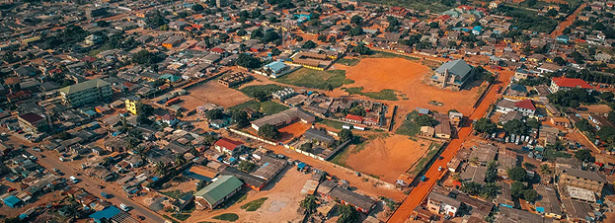Ghanaian Urban Food Environments – NFP collective impact coalition in the making

Last year’s Food & Business Knowledge Platform’s work on food and nutrition security from a food systems approach in Ghana and on measuring the Food Environment revealed a great need and huge potential for a Ghanaian Dutch multi-stakeholder collective impact coalition and further private and public sector development in the field of Urban Food Environments. Reasoning from consumer perspectives in food systems approach, specifically in African urban settings, can strongly improve food security outcomes for a significant amount of SDG2 target populations that suffer from (the double burden of) malnutrition. This potential, in combination with the great sense of urgency and increasing international attention for Urban Food Environments, calls for a response from the Netherlands. The Food & Business Knowledge Platform has picked up this task that will be further developed within the Netherlands Food Partnership (NFP). As Ghana is an African frontrunner in the field of Food Environments research and policy wise, the NFP collective impact coalition will start focussing on Accra, aligning with the Dutch EKN there.
Last October the first online meeting took place with +30 interested stakeholders from Ghana and The Netherlands, from food and nutrition experts, to urban planners, government officials, as well as actors from the field of marketing, labelling and education, and representatives of consumers, producers and retailers, also from the informal sector. The meeting was set up to explore the added value of a Dutch-Ghanaian NFP coalition on food environments. A ‘scene setter’ document composed by F&BKP/NFP – including information on the costs and consequences of unhealthy diets in Africa; related system challenges in reaching SDG2 on zero hunger and malnutrition in all its forms; the choice for Ghana as a NFP case on Food Environments; and first ideas concerning the potential added value of a coalition – served as a basis for the exchange. Explained was also that in this work Food Environments are seen as the range of dimensions (such as availability, affordability, desirability) that can enable or restrict healthy dietary choices, by providing opportunities or constraints that influence peoples’ decisions about what to eat.
In the online meeting participants underscored that: the coalition is timely and needed; early engagement of relevant players is needed; multi-sectoral and multi-level collaboration is the way to go; linkage to ongoing projects and programmes is important; conflict of interests should be managed through joint vision development; besides knowledge dissemination, co-creation and implementation should be practiced; and it is important to understand conditions for effectiveness. During the meeting inventories of potential leverage points and potential coalition contributions were made, which can be found in the meeting report.
Based on this, the F&BKP/NFP developed a framework for the upcoming coalition work in 2021 that consists of 4 domains : 1) The Urban Consumer; 2) Trading and Purchasing Environment; 3) Food Product Creation; 4) The Enabling Environment. In each of these domains, which contain more specific dimensions of the Food Environment, action groups will be further developed. These action groups will pick up certain leverage points within a wider food systems perspective, drawing from their experiences and existing knowledge. They will jointly work on combining local needs, policies and scientific insights to develop, pilot and scale-up practical sustainable solutions, putting the urban consumer center stage with the aim to make their diets more nutritious.
Anyone interested in more information about or interested in joining this NFP coalition can contact Knowledge Broker Vanessa Nigten via the Netherlands Food Partnership:
A presentation with more information on the NFP and the Ghanaian Urban Food Environments initiative held during the first Food Environment Research Network (FERN) meeting can be viewed/heard here.





